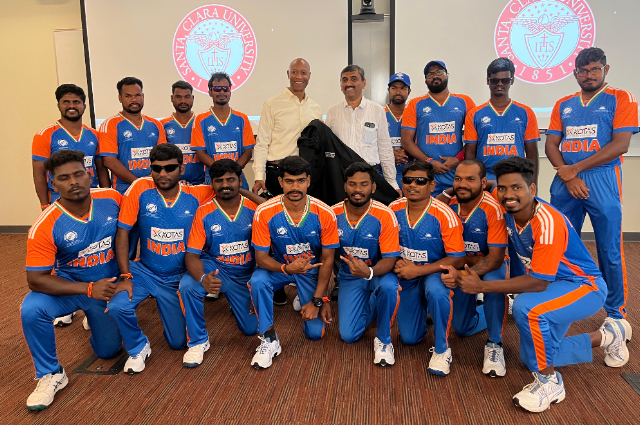India has made the significant decision to withdraw from the 4th T20 Blind Cricket World Cup, set to be held in Pakistan from November 22 to December 3. The Cricket Association for the Blind in India (CABI) announced this decision following the Indian government’s refusal to grant the necessary clearance for participation.
A Tough Call Amid Rigorous Preparations
CABI revealed that the Indian team had been training diligently in anticipation of this international tournament. The players who were full of enthusiasm and competitive spirit, were ready to showcase their skills on a global stage. However, the association emphasized its respect for the government’s decision and its commitment to aligning with national directives.
Government's Role in the Decision
The non-clearance from the Indian government reflects the complexities often involved in international sporting events, particularly when they overlap with geopolitical considerations. CABI, being a responsible body had prioritized adhering to the government’s stance while expressing regret over missing this key opportunity for its players.
Unwavering Dedication to Blind Cricket
Despite the setback, CABI reaffirmed its focus on advancing Blind Cricket within the country. The organization remains persistent in nurturing talent by enhancing infrastructure and promoting inclusivity in sports. While the withdrawal is disappointing for the players and fans alike, CABI’s decision emphasizes a balanced approach between sporting aspirations and national policy adherence.
This development has sparked discussions about the intersection of sports and politics as well as the challenges faced by athletes with disabilities. While the Indian team’s absence will be felt at the tournament, CABI’s decision reflects a broader commitment to national priorities and the sustainable growth of Blind Cricket in India.
Fostering Resilience and Talent: The Indian Blind Cricket Team’s Unwavering Spirit
- Playing with Passion and Representing a Nation: The Indian Men's Cricket Team for the Blind, led by its captain, Durga Rao Tompaki, exemplifies the true spirit of sportsmanship and patriotism. Speaking on behalf of his team, Rao expressed the pride they feel in representing their country on international stages. "We play with passion, and we represent our country with immense pride," he shared, reflecting the deep sense of commitment that drives their efforts. Competing at the highest levels of the sport has always been their dream and expressing the disappointment of missing out on recent opportunities is even more emotional.
- Eyes on the Next World Cup: Despite the setback, the team remains persistent in their focus on the future. With the next World Cup approaching, Rao assured that their commitment to rigorous training and preparation remains firm. "We know that the next World Cup is just around the corner," he stated emphasizing the importance of persistence and hard work. This positive outlook emphasizes their belief in turning challenges into opportunities.
- Nurturing New Talent: One of the key takeaways from the team’s recent coaching camp has been the discovery of emerging talent. Rao highlighted the potential of these young players, expressing optimism about their ability to drive the team to new heights. “It’s time to nurture these talents and ensure that our team is ready when the next tournament comes,” he added. The focus now shifts to developing these promising players, coming together to their skills with the experience of seasoned members to create a well-rounded squad.
Commitment to Excellence
The Cricket Association for the Blind in India (CABI) has reaffirmed its dedication to supporting the team’s growth. By fostering fresh talent and refining the skills of current players, CABI ensures that the team remains competitive on the global stage. This ongoing commitment reflects a broader vision of empowering the sport and securing a bright future for blind cricket in India.
A Unified Goal
As the Indian Blind Cricket Team continues its journey, their resilience, teamwork and passion remain at the forefront. Though the road may be challenging, their unified goal of achieving excellence and making the nation proud serves as a powerful reminder of the strong spirit of sports.
. . .
References:

